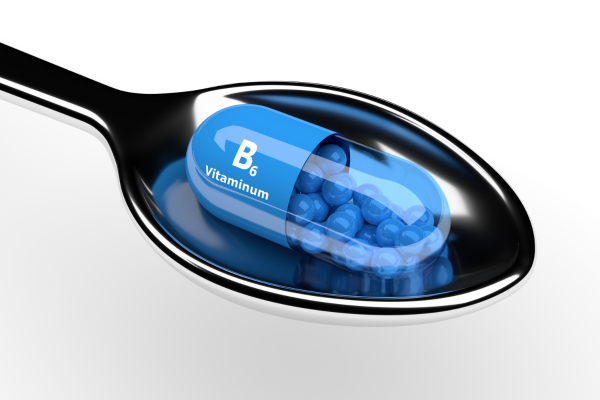The Vital Role of Vitamin B6 in Health – By Dr Harold Gunatillake


Understanding the Powerhouse Behind Mood, Immunity, and Energy
This diligent vitamin performs numerous essential functions. It influences your mood, appetite, sleep, and cognitive processes. It is necessary for combating infections, metabolising food into energy, and facilitating the transportation of oxygen by your blood throughout the body.
Although deficiency is uncommon, it is crucial not to lack this vital nutrient.
Vitamin B6, also known as pyridoxine, is an essential nutrient that plays a crucial role in maintaining optimal bodily function. Although it often functions discreetly in the background, this diligent vitamin influences numerous physiological processes, including mood regulation, immune response, energy production, and cognitive health. Let us examine the various ways in which vitamin B6 supports overall health, the potential consequences of deficiency, and strategies to ensure adequate intake.
What is Vitamin B6?
Vitamin B6 is a water-soluble vitamin naturally present in numerous foods, added to others, and is available as a dietary supplement. It manifests in various forms, such as pyridoxine, pyridoxal, and pyridoxamine, all of which are metabolised within the body to the active form, pyridoxal phosphate. This active form plays a vital role in various biochemical reactions that influence multiple systems within the body.
The Many Functions of Vitamin B6
- Vitamin B6 truly wears many hats! Here’s a warm look at how it supports your well-being:
- Brain Health and Mood Regulation: Vitamin B6 is a key player in making neurotransmitters—tiny messengers in your brain. These include serotonin, which lifts your mood and promotes happiness; norepinephrine, involved in how you handle stress; and GABA, which helps keep your nervous system calm. When B6 levels are low, you might notice mood swings, irritability, or even feelings of sadness.
- Metabolism and Energy Production: Think of B6 as your body’s energy assistant, transforming the foods you eat- protein, carbs, and fats- into the fuel that keeps you going every day. It helps enzymes do their jobs so that you can feel energised.
- Immune System Support: B6 is like a friendly helper that strengthens your immune defences by aiding the creation of fighters like antibodies and white blood cells. Low B6 levels might make it easier to catch colds and other illnesses.
- Red Blood Cell Formation: This vitamin supports your body in making haemoglobin, the protein that carries oxygen from your lungs to every corner of your body. Without enough B6, you could feel tired and weak due to anaemia.
- Cognitive Development and Function: During pregnancy and early childhood, B6 is essential for healthy brain development. It also helps keep your mind sharp and functioning well throughout your life.
- Hormonal Balance: B6 participates in making hormones and neurotransmitters, helping to keep your appetite, sleep, and stress levels in harmony.
- Reducing Inflammation and Chronic Disease Risk: Some studies suggest B6 might help reduce long-term inflammation and lower the risk of diseases like heart disease by controlling homocysteine levels—a substance linked to heart health.
Symptoms and Risks of Vitamin B6 Deficiency
While vitamin B6 deficiency is relatively uncommon, certain factors can increase an individual’s risk of deficiency. These include advanced age, specific medications, chronic kidney disease, alcoholism, autoimmune disorders, and malabsorption syndromes such as celiac disease or Crohn’s disease.
Manifestations of vitamin B6 deficiency may encompass:
- Anaemia accompanied by fatigue
- Confusion, irritability, or depression
- Compromised immune function resulting in recurrent infections
- Cracked or sore lips and mouth ulcers
- Glossitis, characterised by a swollen tongue
- Skin rashes or seborrheic dermatitis
- Tingling or numbness in the hands and feet attributable to nerve impairment
- Decreased appetite
Since vitamin B6 is water-soluble, the human body does not retain significant reserves of it. Consequently, a consistent intake of nutrients through dietary sources is essential for maintaining good health.
 How Much Vitamin B6 Do You Need?
How Much Vitamin B6 Do You Need?
The recommended dietary allowance (RDA) for vitamin B6 varies according to age, sex, and life stage. For most adults, the RDA ranges from 1.3 to 2.0 milligrams per day. Pregnant and breastfeeding individuals require slightly higher amounts to support the development of the fetus and infant. It is generally straightforward to meet the body’s B6 requirements through a balanced diet; however, in cases where there is a risk of deficiency, a healthcare provider may advise supplementation.
Best Food Sources of Vitamin B6
Vitamin B6 is widely available in both animal and plant-based foods. Here are some excellent sources:
- Poultry such as chicken and turkey
- Fish, especially salmon and tuna
- Organ meats, like liver
- Pork
- Starchy vegetables, including potatoes and sweet potatoes
- Non-citrus fruits, such as bananas and avocados
- Whole grains and fortified cereals
- Legumes like chickpeas and lentils
- Nuts and seeds, including sunflower seeds
- Spinach and other leafy greens
Cooking can reduce the B6 content in some foods, so eating a variety of both raw and cooked options is a good strategy.
Vitamin B6 and Special Health Considerations Pregnancy and Infancy
Vitamin B6 is essential for the proper development of the brain in fetuses and infants. Expectant parents need slightly higher levels to support healthy pregnancy outcomes and reduce the risk of morning sickness.
Older Adults
Older adults are at higher risk of B6 deficiency due to decreased absorption and potential interactions with medications.
Maintaining adequate intake can help support cognitive function and immune health as we age.
Chronic Conditions
Certain chronic illnesses, such as kidney disease and autoimmune disorders, can impair the body’s ability to absorb or utilise B6 effectively. In these cases, supplementation under medical supervision may be required.
Vegetarian and Vegan Diets
While B6 is present in plant foods, some plant-based eaters may need to be more mindful of their intake to ensure they’re getting enough.
Can You Get Too Much Vitamin B6?
Unlike specific vitamins, toxicity from vitamin B6 is possible; however, this occurs only when high-dose supplements are consumed over an extended period of time. An excess of B6 may result in nerve impairment, manifesting as numbness and gait disturbances. The maximum recommended daily intake for adults from supplements is 100 mg, significantly surpassing the amount obtained solely through dietary sources. It is essential to consult a healthcare professional before initiating high-dose B6 supplementation.
Tips for Maintaining Healthy Vitamin B6 Levels
- Eat a balanced, varied diet with plenty of whole
- Include both animal and plant sources to diversify your
- If you fall into a risk group (older adults, pregnant, or with chronic illness), speak with your healthcare provider about your needs.
- Be cautious with supplements—more is not always
Conclusion
Vitamin B6 might not always be the star of the show, but it plays so many vital roles in keeping us healthy, from uplifting mood and boosting energy to strengthening our immune defence and supporting brain health. Although deficiencies are rare for most people, understanding why this vitamin is essential is beneficial, as it helps ensure you’re getting enough through your diet or supplements, if needed. Shining some love on this often- overlooked hero in the vitamin world can set you on the path to a healthier, more vibrant life.
Hope this article was useful.




















